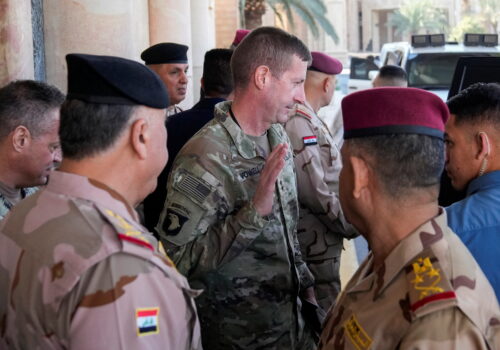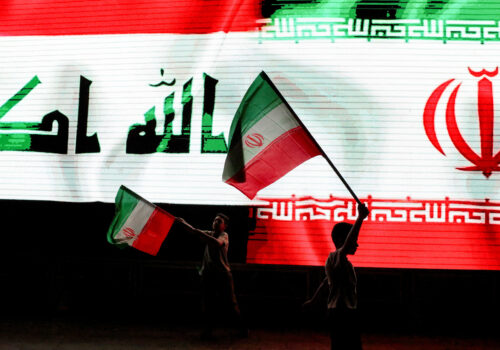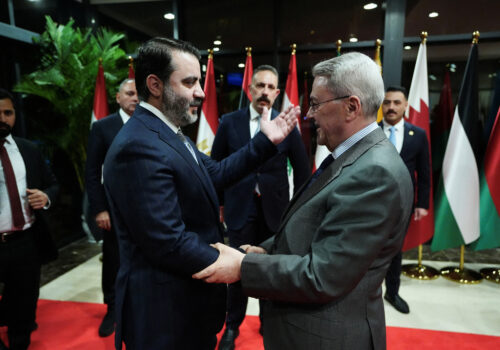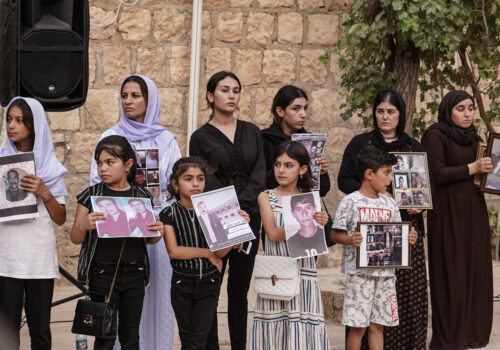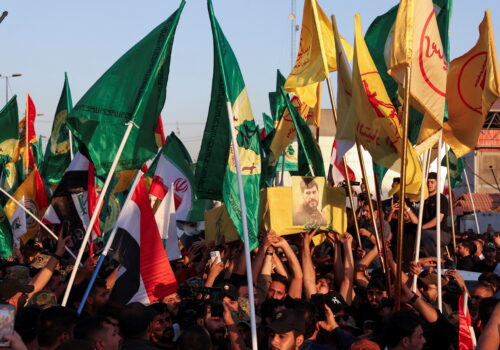Ten questions (and expert answers) on Operation Inherent Resolve’s end in Iraq
The US-Iraq partnership is entering a new era. This September, the Global Coalition to Defeat the Islamic State of Iraq and al-Sham (ISIS) is set to end its mission in Iraq.
Announced last year by former US President Joe Biden’s administration and the Iraqi government, the agreed timeline to end Operation Inherent Resolve’s (OIR) Iraq mission stipulates that coalition operations in neighboring Syria—where partners agree ISIS remains a serious threat—will continue, based out of Iraq.
This new frontier in the US-Iraq relationship presents numerous opportunities, challenges, and uncertainties. Read on for expert responses to ten pressing questions on this moment of change—and reflection—for Washington’s posture in the Middle East.
1. What does OIR’s end mean for the future of the US-Iraq security cooperation?
The shift to a peacetime, bilateral security framework—at Baghdad’s request—will be an important test for both the United States and Iraq. The greatest risk is a repeat of Washington’s neglect and Baghdad’s politicization of the security forces after 2011, which paved the way for the Islamic State of Iraq and al-Sham’s (ISIS) rise. A further disadvantage is that the end of Operation Inherent Resolve (OIR) will leave US–Iraq relations at their lowest level of security engagement since 2014, just as a new administration takes office in Baghdad after the upcoming November elections. To avoid squandering both the hard-earned defeat of ISIS and Iraq’s fragile stability, Washington and Baghdad must commit to a durable partnership in important areas, such as intelligence sharing, procurement, training, and leadership development—rather than treating the end of OIR as a pretext for a security “divorce.”
—Omar Al-Nidawi is a Middle East analyst focusing on Iraqi political, security, and energy affairs. He is currently the Director of Programs at Enabling Peace in Iraq Center (EPIC).
In the agreement between the United States and Iraq announced last year, the end of Operation Inherent Resolve (OIR) included a commitment to transition security cooperation under OIR to a bilateral security relationship with Iraq. This transition allows for deepening security and defense cooperation between the two countries based on mutual areas of interest, including counterterrorism, cybersecurity, border security, exercises, and information sharing, to name a few. Through more focused bilateral cooperation and collaboration, the United States will have the opportunity to bring Iraq into some aspects of US Central Command’s (CENTCOM) broader theater engagement strategy, strengthening multilateral security cooperation with some of Iraq’s neighbors against regional threats, including the continuing defeat of the Islamic State in Iraq and Syria (ISIS). A deepening of the US-Iraqi security partnership will also contribute to better cooperation and integration between Iraqi and Kurdish security forces. ISIS remains a regional and global threat, so building a long-term partnership with Iraqi and Kurdish security forces to take on an even greater role in the continuing defeat of ISIS should remain a key focus for the foreseeable future. Finally, a deeper security partnership opens the door to even greater engagement and influence over the Iraqi government’s security sector reform process and efforts to make the Iran-backed Popular Mobilization Forces (PMF) more accountable to the state. As US troops redeploy, it should be less about how many US troops remain in the country or where they are located. Instead, the future of the partnership should be based on what areas will be its focus and how bilateral security cooperation will be conducted under the work of the Iraq-US Higher Military Commission and a more formal annual Joint Security Cooperation Dialogue.
—Alina L. Romanowski is a distinguished fellow with the Scowcroft Middle East Security Initiative at the Atlantic Council’s Middle East programs. She most recently served as the U.S. Ambassador to Iraq (2022-2024) and Kuwait (2020-2022).
Related reading
2. How will the end of the OIR mission impact the US-Iraq relationship?
The end of Operation Inherent Resolve (OIR) is eight years overdue. The defeat of the Islamic State of Iraq and al-Sham (ISIS) in 2017 accomplished two objectives: the elimination of the existential threat of the post-2000 Iraqi transition to democracy and the political system undertaking this transition, and the reconfiguration of Iraq’s military into a more confident security force that can protect the Iraqi people from a similar threat. Once these two main objectives were met, there remained no logic to keeping the wartime security infrastructure in place. From this point, the mission sent the wrong message to the Iraqis that the US military was in Iraq to stay indefinitely.
The successful negotiations and their implementation are positive steps forward. As they proceed with a new bilateral security arrangement, Iraq and the United States can maintain a credible level of deterrence to any possible domestic and external security threats to Iraq and the wider region. This simultaneously clears the way for more conducive cooperation on the bilateral relationship across a diverse range of sectors, in accordance with the letter and spirit of the US-Iraqi Strategic Framework Agreement.
The US invasion of Iraq and its aftermath, along with the nature of US foreign policy toward Iraq and the Middle East region at large, made the concept of a mutually beneficial US-Iraqi partnership very hard to present to the Iraqi people. Faithful implementation of this agreement will be very helpful in accomplishing this objective.
—Abbas Kadhim is a resident senior fellow with the Atlantic Council’s Iraq Initiative. Previously, Kadhim led the Iraq Initiative at the Atlantic Council’s Middle East Programs until July 2025. He also previously held a senior government affairs position at the Iraqi Embassy in Washington, DC.
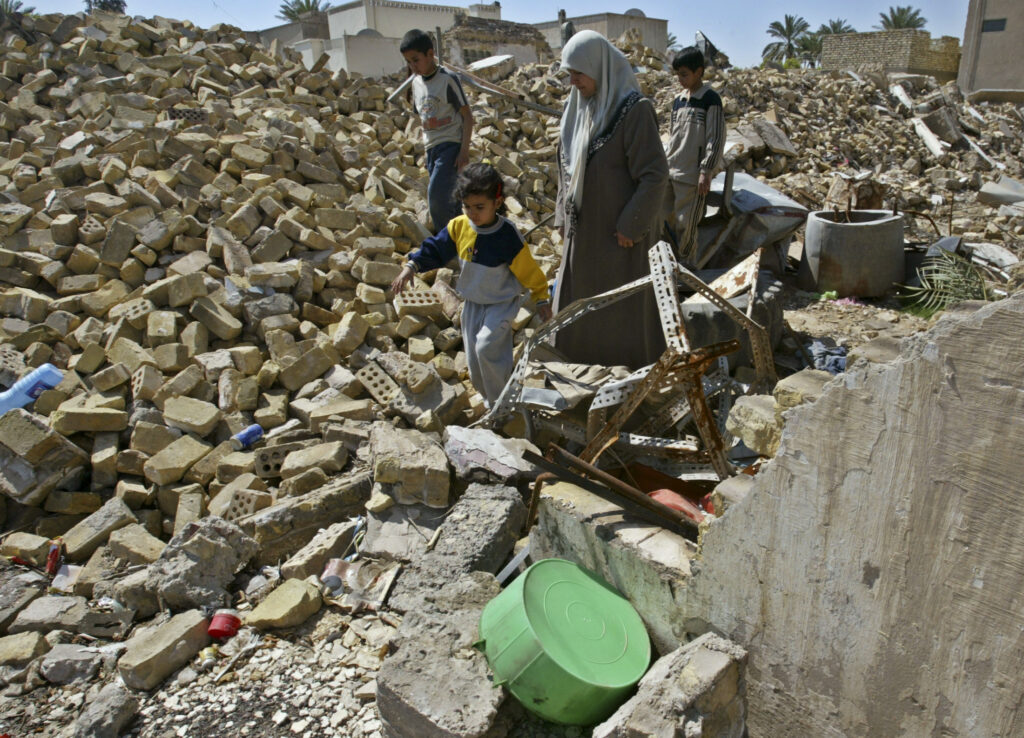
The end of the US-led mission against the Islamic State of Iraq and al-Sham (ISIS) is a significant turning point for US engagement in Iraq, providing an opportunity to reshape not only the US-Iraq security partnership but also the overall relationship with Iraq. For Iraq, the departure of US troops from federal Iraq is a reassertion of Iraqi sovereignty after more than two decades of foreign troop presence. The US military presence remains a domestic political flashpoint there, and normalizing this security partnership could reduce a source of friction. For the United States, it’s the conclusion of the first “forever war,” a military intervention that ultimately cost billions of dollars and thousands of Iraqi and American lives. This relationship remained anchored by the ongoing US military presence even as Iraq has continued to recede from the consciousness of the American public, and increasingly from American policymakers. Even as Iraq will remain important to advancing US national security interests in the Middle East, this is also a moment to create a more balanced partnership. US engagement should focus on broadening the bilateral relationship by promoting strengthened economic ties, including by promoting investment in Iraq’s still untapped energy sector. Promoting Iraq’s energy independence and prosperity will also ultimately contribute to a more stable and secure Iraq.
—Victoria J. Taylor is the director of the Iraq Initiative in the Atlantic Council’s Middle East program. She served most recently as deputy assistant secretary for Iraq and Iran in the State Department’s Bureau of Near Eastern Affairs, where she advised senior State Department leaders on Iraq and Iran in the aftermath of the Gaza conflict.
3. What is the legacy of the US military mission in Iraq?
The legacy of the US military mission in Iraq is one of profound paradox. While it dismantled Saddam Hussein’s dictatorship, set the foundation of a new political order, and enabled the defeat of the Islamic State of Iraq and al-Sham (ISIS), it also produced enduring instability, sectarian fragmentation, and a dramatic shift in regional power dynamics. For Iraqis, the consequences diverged sharply. For many Sunnis, the fall of Hussein marked the collapse of their historic political dominance, ushering in marginalization, violence, and the rise of insurgency. For the Kurds, it was closer to a liberation narrative: the US mission enabled the consolidation of the Kurdistan Regional Government, fostering relative security, political autonomy, and economic growth. Among the Shia majority, initial optimism, rooted in newfound political representation, gradually gave way to disillusionment as governance faltered, corruption spread, and sectarian violence intensified.
From a geopolitical perspective, the US mission generated outcomes often described as counterproductive. The removal of the former Iraqi dictator paved the way for Tehran to expand its influence through political, economic, and paramilitary channels across Iraq and the wider Middle East.
The intervention’s human cost has been staggering. Hundreds of thousands of Iraqi civilians were killed, millions were displaced, and the country’s infrastructure sustained catastrophic damage. Beyond physical destruction, the war disrupted social cohesion, eroded trust in state institutions, and produced a generation scarred by conflict. For many observers, these humanitarian and developmental consequences represent the most enduring and tragic dimensions of the US mission.
This ending is widely regarded as a strategic setback for US interests and its regional allies, as it shifted the regional balance of power in ways that bolstered Iran’s position while straining Washington’s alliances. Analysts frequently point to Iraq as a cautionary tale of “geostrategic overreach,” where short-term military success undermined long-term strategic stability.
—Yerevan Saeed is a nonresident senior fellow with the Iraq Initiative in the Atlantic Council’s Middle East programs. Saeed is the Barzani scholar-in-residence in the Department of Politics, Governance & Economics at American University’s School of International Service, where he also serves as director of the Global Kurdish Initiative for Peace.
The second US mission in Iraq, launched in 2014, played an indispensable role in liberating Iraq from the Islamic State in Iraq and al-Sham (ISIS) and helping defeat the group in Syria. Without US intervention—and given the severe limitations of Iraqi forces—the war could have dragged on for years, with the potential to further intensify and spread sectarian violence. But while the mission’s military achievements are undeniable, it also illustrates the risks of alliances of necessity: they can sow the seeds of future conflict. The irony is stark—the same factions that desperately relied on US support against ISIS now celebrate Washington’s exit as a triumph over “the occupier.” Yet with no US troops left as “hostages” inside Iraq, what these groups spin as victory could in fact free Israel’s and the United States’ hands to target them—and Iraq more broadly—in a future confrontation with Iran.
—Omar Al-Nidawi
Related reading
The legacy of the US mission in Iraq is complicated and fraught with different perspectives among both Americans and Iraqis. Bottom line, for our own strategic interests, the United States has stood by the Iraqis more than any other country and worked to bring stability to Iraq on multiple occasions. We share the tragic loss of life, the hardship of defeating the Islamic State in Iraq and al-Sham (ISIS), and the challenges of bringing good governance, rule of law, and functioning institutions after the fall of Saddam Hussein. Not all Iraqis share a positive view of the United States, but a majority understand that a strong US-Iraqi partnership, not just in security areas, is critical to Iraq’s future development and sovereignty and the region’s stability.
—Alina L. Romanowski
4. Is this a withdrawal, or a transition?
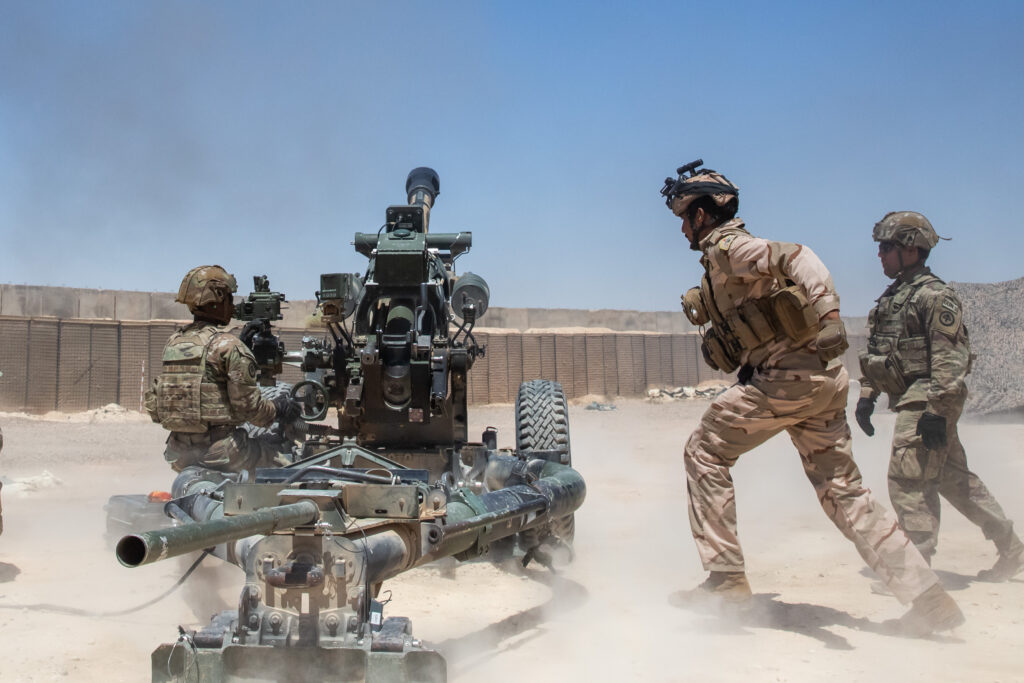
Whether this is a withdrawal or a transition will depend on the details. US President Donald Trump’s administration has yet to announce how Washington’s troop presence will change, including whether US troops will remain in federal Iraq, how many, and where they will be located.
The answers to these questions have direct bearing on the future of US-Iraqi security cooperation and whether the United States will continue to be a strategic military partner for the Iraqi Security Forces. Even with a reduction in the US troop presence, the United States could manage an effective transition from the Global Coalition to Defeat the Islamic State of Iraq and al-Sham, or D-ISIS Coalition, to a bilateral military relationship that retains core operational capabilities for counterterrorism cooperation. However, a more complete withdrawal of US troops and a narrowly scoped program of security cooperation would dramatically reduce US influence in Iraq and provide an opening for Iran to exploit.
—Victoria J. Taylor
5. How will the end of the OIR mission impact US security interests with respect to Iran and extremism?
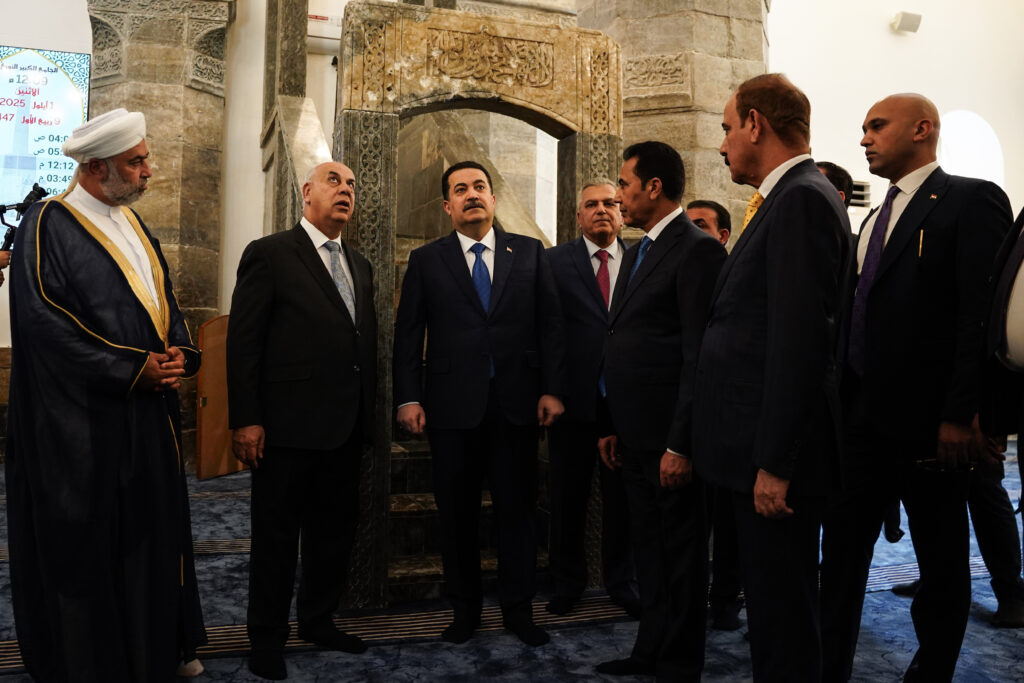
While US participation in Operation Inherent Resolve (OIR) was critical to fighting the Islamic State of Iraq and al-Sham (ISIS), it was provocative to Iran, which would prefer that Washington not be stationed, or play any role, in Iraq (or anywhere else in the Middle East). So, we find ourselves at an interesting moment. Both ISIS and Iran are down, but not out.
While ISIS’s operational capabilities in Iraq continue to decrease, its global presence will make its defeat difficult. Should a future Iraqi government adopt policies that alienate Sunni Iraqis, then you will again have conditions for the same kind of resurgence we saw in 2014. Thus, it will be in our interests to have a close enough relationship with Baghdad to encourage more inclusive policies, while also enabling cooperation to monitor and contain ISIS.
For Iran’s part, Israeli and US strikes against it have made it less attractive as a partner, which has likely played a role in its Iraqi proxy’s seeming unwillingness to engage Israel, despite their rhetoric. At the same time, it has increased Tehran’s sense of urgency regarding limiting US-Iraq relations and any US military presence. Therefore, we can expect any improvement in relations to be met with a response intended to constrain the US presence and prevent the expansion of economic and other relations critical for Iraq’s continued trajectory toward stability. Ultimately, Iraq has an interest in maintaining relations with both the United States and Iran. Doing is and will continue to be a tricky balancing act, where neither partner is likely to be happy with the outcome. But ultimately, I don’t think its interests change: defeat terrorism, avoid regional conflict, and play a stabilizing role in the region.
—C. Anthony Pfaff is a nonresident senior fellow with the Iraq Initiative in the Atlantic Council’s Middle East Programs and the research professor for the Military Profession and Ethic at the Strategic Studies Institute (SSI), US Army War College in Carlisle, PA.
Much will depend on whether the United States’ and Iraq’s next government treat the post-Operation Inherent Resolve (OIR) relationship with the seriousness it requires. If, as expected, the November elections produce a government more thoroughly dominated by Coordination Framework factions—with moderates like Haider al-Abadi absent—then ties will likely be tenuous at best. In that case, the loss of US “eyes and ears” in Iraq will create a more permissive environment for Iran to expand its influence and rebuild regional power projection, compensating for setbacks to Hezbollah and the overthrow of Bashar al-Assad’s regime in Syria. Such moves would heighten the risk of Iraq being drawn into the next regional conflagration, with major implications for Middle East stability, global energy security, and the threat of terrorism.
—Omar Al-Nidawi
Related reading
6. How will the end of the OIR mission impact US security interests in Syria?
The end of the Operation Inherent Resolve (OIR) mission would significantly weaken US security interests in Syria. OIR has been the backbone of intelligence sharing and coordinated strikes that have kept the Islamic State of Iraq and al-Sham (ISIS) contained. If the mission concludes without an alternative framework, ISIS cells in the Badia and along porous borders could regenerate, threatening regional stability and US partners.
Strategically, losing Erbil as the platform for Syrian operations after 2026 would force a shift to Kuwait, reducing proximity, agility, and credibility. The legal basis for US operations, currently tied to Iraq’s 2014 United Nations letter, is also fragile—if Baghdad revokes it, Washington would lack a clear international mandate. A Syrian request to join the Global Coalition to Defeat ISIS could provide a new legal foundation, sustain coalition presence, and even broaden European participation.
Beyond counterterrorism, OIR’s end would erode US leverage vis-à-vis Russia and Iran inside Syria. For the United States, maintaining a credible counter-ISIS mission is not just about defeating ISIS; it’s about preserving influence, ensuring allies’ security, and preventing a vacuum that adversaries could exploit to undermine both regional stability and Syria’s fragile transition.
—Ibrahim Al-Assil is the Syria Project lead for the Atlantic Council’s Middle East programs. Al-Assil is also a Postdoctoral Research Fellow at Harvard’s Middle East Initiative at the Belfer Center.
Related reading
The end of the Operation Inherent Resolve (OIR) mission in Iraq occurs against the backdrop of the political transition in Syria, with the potential for instability in Syria to create an opening for an Islamic State in Iraq and al-Sham (ISIS) resurgence. The US military presence in Iraq remains the core logistical platform not only for ISIS operations in Iraq, but also in Syria. While a reduction in the US military presence in federal Iraq is likely to diminish counter-ISIS capabilities there, the September 2026 deadline to end the logistical platform in Iraq for OIR’s Syria operations will create a starker security challenge should the United States choose to continue its military presence in Syria. More broadly, the US security partnership with Iraq continues to be a counterweight to Iranian influence in Iraq. The scale and scope of the future US security relationship with Iraq is also of concern to other regional partners who would like to see a stable Iraq, with the Gulf, Jordan, and Israel all closely watching the next steps.
—Victoria J. Taylor
The continuation of Operation Inherent Resolve (OIR) in Iraq to support the counter-Islamic State of Iraq and al-Sham (ISIS) operations in Syria until the end of 2026 will provide a key area for US-Iraq bilateral security cooperation and involvement in the regional dialogue about the direction of the new Syrian government. What happens in Syria can affect Iraq and the region’s stability. Iraq’s Prime Minister and its security forces are concerned about the security situation in Syria, including the movement of non-state actors, terrorists, and drug trafficking across the Syrian-Iraqi border. As OIR winds down, security issues across that border and in Syria will offer another critical area to strengthen bilateral cooperation.
—Alina L. Romanowski
7. How can the United States ensure that the end of the OIR mission does not result in diminished US influence?
The United States will need to stay closely engaged in building a security partnership that supports US interests in the region and shapes Iraqi decision-making. While Washington and Baghdad would like to see increased economic investments in Iraq, many issues remain contentious, including the Iran-backed Popular Mobilization Forces’ (PMF) institutionalization, corruption, oil smuggling, Iranian influence, armed non-state actors, and terrorist groups undermining Iraq’s sovereignty. These and other issues will complicate continued US military cooperation. Without a US security partnership, prospects for additional US economic investment in Iraq will diminish considerably. The recent visit of the new Central Command Commander, Vice Admiral Brad Cooper, shortly after taking up his new position, sends a signal to Iraqi Prime Minister Mohammed Shia al-Sudani and his military leadership—as well as to the region—that an active US-Iraq security partnership and engagement remains important to the United States. Now, it’s up to the Iraqis to make that happen.
—Alina L. Romanowski
8. How have Sunni attitudes shifted on the US military presence and how does the Sunni community view the departure of US forces?
Sunni Arab attitudes toward the United States began shifting positively well before Operation Inherent Resolve (OIR)—during the mission’s Surge and Awakening, when many realized that working with the United States was the best way to defeat al-Qaeda in Iraq and to check the power of Shia hardliners in Baghdad. That pragmatic view persisted through the fight against the Islamic State of Iraq and al-Sham (ISIS). Today, with ISIS defeated and Iraqi politics increasingly transactional, Sunni leaders may feel less dependent on the United States as a buffer. Still, Sunni communities remain vulnerable: whether the threat is an ISIS resurgence from Syria, a regional war, or renewed sectarian conflict, they often bear very heavy costs when Iraq enters another crisis.
—Omar Al-Nidawi
9. How do the Shia political elite view the end of the OIR mission and the future of the US-Iraq partnership?
Iraqi Shia leaders view this moment with mixed feelings. On the one hand, the end of the Operation Inherent Resolve (OIR) mission serves their pro-Iran inclinations and interests. Tehran is increasingly becoming their strategic partner and protector, and their top priority is to remain in power. Iran already has clear deliverables in helping them to maintain that hold—during the post-2021 election saga, Tehran helped Shia leaders defeat the Sadrist challenge. On the other hand, they worry about losing the United States because of their reliance on Iran. It is very difficult for them to find a comfortable balance between Washington and Tehran, particularly given the shrinking room for maneuver they face as a result of the current US–Iran confrontation.
—Akeel Abbas is a DC-based academic and journalist. His research and publications deal with national and religious identities, as well as modernity and democratization in the Middle East.
10. What impact does OIR’s end have on Kurdish interests, and how will this reshape dynamics between Erbil and Baghdad?
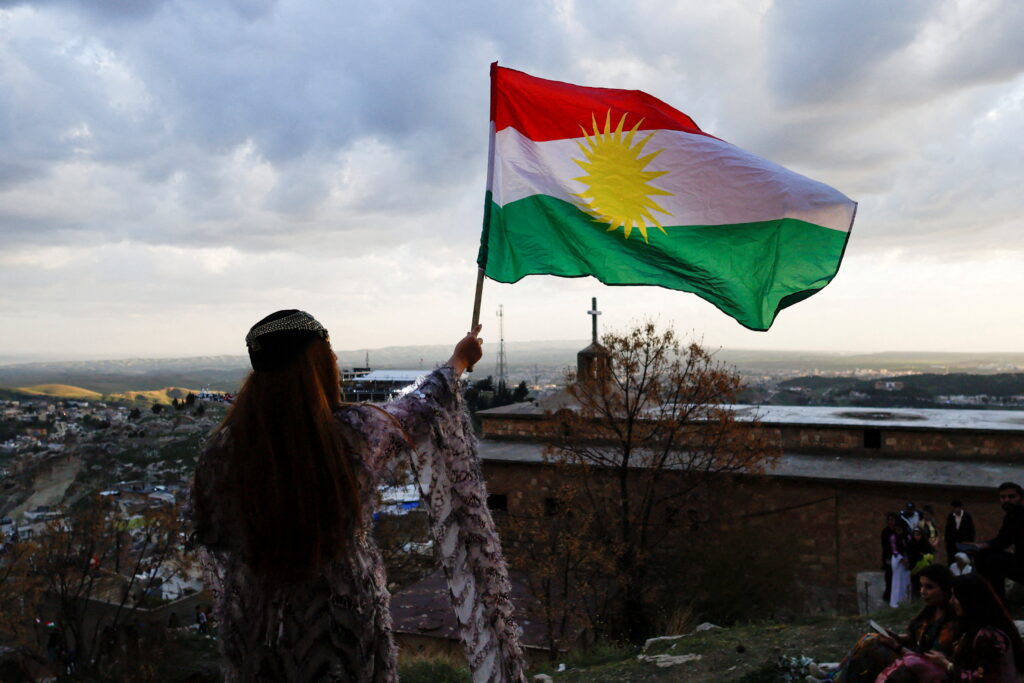
The first real test of Iraq’s federal structure and the acceptance of the Kurdistan Region as a federal autonomous region will come after September 2026, when the Operation Inherent Resolve (OIR) mission will conclude. If Washington opts for a complete pullout after 2026, Kurdish interests will undoubtedly face significant setbacks. No doubt that for Iraqi Kurds, the US military presence has long served as a security umbrella against Baghdad, and a strategic guarantor of Kurdish autonomy. The absence of US forces would tilt the balance of power decisively toward Baghdad, eroding Kurdish leverage. Historically, this imbalance has had destabilizing consequences. The 2011 US withdrawal created a political vacuum in which the Shia-led government marginalized Sunni politicians, fueling grievances that culminated in the rise of the Islamic State of Iraq and al-Sham (ISIS). Kurdish leaders fear a similar trajectory today, in which Baghdad could take harsher measures to curtail Kurdish autonomy and consolidate centralized authority.
The departure of OIR will therefore reshape Erbil-Baghdad dynamics by removing a key external stabilizer. For the Kurds, US forces have been more than a military presence; they have been an anchor of security, stability, and leverage. Whether the post-OIR era mirrors the post-2011 instability or instead ushers in a more pragmatic Baghdad will depend on the central government’s willingness to avoid repeating past mistakes. Will Baghdad return to authoritarian centralization that could exacerbate ethnic and sectarian divisions? Or will it enact constitutional accommodations and acknowledge that durable stability requires a respect for constitutional frameworks? The stakes extend well beyond Kurdish autonomy: the outcome will influence Iraq’s internal cohesion and the broader balance of power in the Middle East.
— Yerevan Saeed
Further reading
Thu, Jul 24, 2025
An open wound, a fading light: Marking eleven years since the Yezidi genocide
MENASource By
One consequence of the Middle East's shifting landscape has been an erosion of international attention on Yezidi issues.
Thu, Aug 7, 2025
Regenerative farming in Iraq: Challenges, opportunities, and policy recommendations
Issue Brief By
Despite the challenges and limitations in the current agricultural policies in Iraq, there are significant opportunities for policy intervention to promote regenerative agriculture.
Mon, Sep 8, 2025
Can Iraq’s partial crackdown on a powerful militia weaken Iran’s proxies?
MENASource By
The prime minister's willingness to face down Kataib Hezbollah is a rare and daring move.
Image: A Task Force Phoenix UH-60 Black Hawk helicopter is prepped for a mission in support of Operation Inherent Resolve in the Middle East. Copyright: xpiemagsx milflic16082021 793 ACHTUNG AUFNAHMEDATUM GESCHÄTZTNo Use Switzerland. No Use Germany. No Use Japan. No Use Austria
